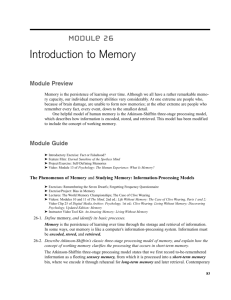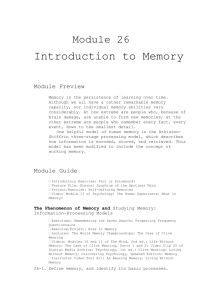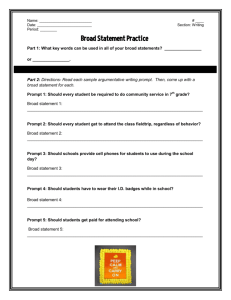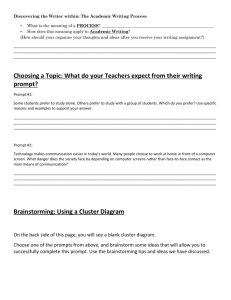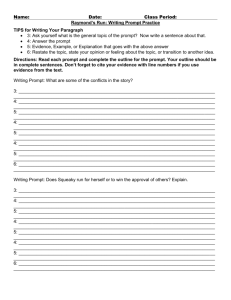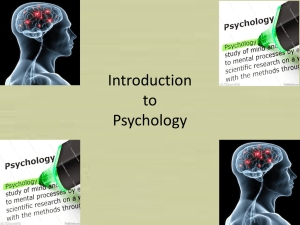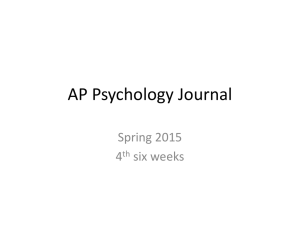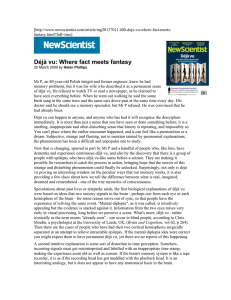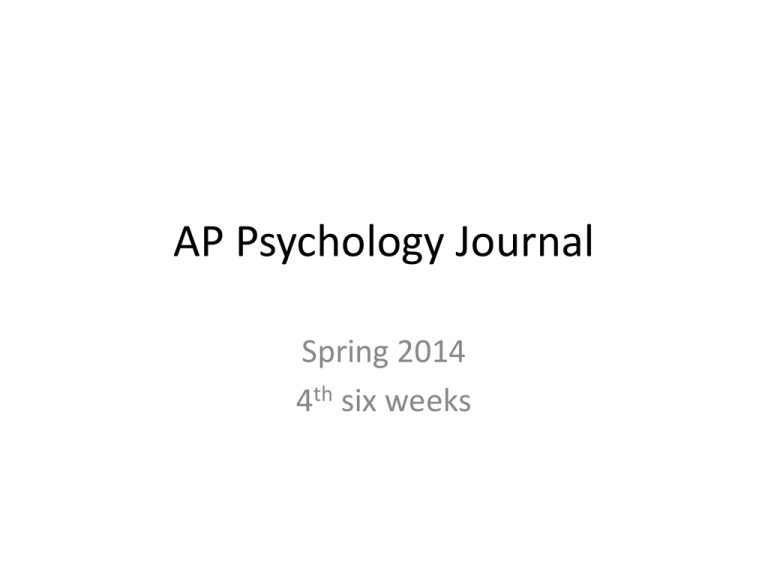
AP Psychology Journal
Spring 2014
4th six weeks
Today’s lesson:
• Journal prompt: What do you remember?
– Self-defining memory
• Memory Activity
• Lesson: Three-stage memory process
• Video: Understanding the Mysteries of
Memory, part I.
– Take notes for extended journal assignment
– No other work during the video!
Memory activity
• Write in your journal the answers to the
question the teacher asks.
Memory Activity
Snow White and the 27 Dwarves
•
•
•
•
•
•
•
•
•
Grouchy
Gabby
Fearful
Sleepy
Smiley
Jumpy
Hopeful
Shy
Droopy
•
•
•
•
•
•
•
•
•
Dopey
Sniffy
Wishful
Puffy
Dumpy
Sneezy
Lazy
Pop
Grumpy
•
•
•
•
•
•
•
•
•
Bashful
Cheerful
Teach
Shorty
Nifty
Happy
Doc
Wheezy
Stubby
• mnemonics posters
Journal Prompt 1/8/2014
Journal prompt: Write about a selfLearning
defining memory you have.
Objective
• What are your emotions about this
3.3 Discuss
memory?
the factors
• Is this memory about a relationship?
influencing
• Is this memory about an enduring
how
theme or unresolved conflict in your
memories
life?
are retrieved.
Self-defining memory
1. It is at least one year old.
2. It is a memory from your life that you remembered very clearly and
that still feels important to you even as you think about it.
3. It is a memory about an important enduring theme, issue, or conflict
from your life. It is a memory that helps explain who you are as an
individual and might be the memory you would tell someone else if
you wanted that person to understand you in a profound way.
4. It is a memory linked to other similar memories that share the same
theme or concern.
5. It may be a memory that is positive or negative, or both, in how it
makes you feel. The only important aspect is that it leads to strong
feelings.
6. It is a memory that you have thought about many times. It should
be familiar to you like a picture you have studied or a song (happy or
sad) you have learned by heart.
7. How many years ago did this happen? (number of years ago, not
your age at the time).
Self-defining memory, part 2
• Use the rating scale 0= zero
to 6= most to rate the
emotions you feel on
recalling this memory.
1. _____ Happy
2. _____ Sad
3. _____ Angry
4. _____ Fearful
5. _____ Surprised
6. _____ Ashamed
7. _____ Disgusted
8. _____ Guilty
9. _____ Interested
10. _____ Embarrassed
11. _____ Contemptful
12. _____ Proud
Studying Memory:
Information Processing Models
Keyboard
(Encoding)
Disk
(Storage)
Sequential Process
Monitor
(Retrieval)
9
Information Processing
Frank Wartenberg/ Picture Press/
Corbis
Bob Daemmrich/ The Image Works
Bob Daemmrich/ The Image Works
The Atkinson-Schiffrin (1968) three-stage model
of memory includes a) sensory memory, b)
short-term memory, and c) long-term memory.
10
Modifications to the Three-Stage
Model
1.
2.
Some information skips the first two stages and
enters long-term memory automatically.
Since we cannot focus on all the sensory
information received, we select information that
is important to us and actively process it into our
working memory.
A newer understanding of short-term memory
that involves conscious, active processing of
incoming auditory and visual-spatial
information, and of information retrieved from
long-term memory.
11
“Understanding the Mysteries of
Memory” Discovery Learning (1996)
• implicit and explicit
memory
• savant syndrome
• traumatic memory
• short term memory loss
• long term memory loss
• flashbacks
• “flashbulb memories"
• mistaken identification
• suggested memories
• trauma induced amnesia
• Alzheimer’s disease
Memory alternative video
This is a program about memory failures using real case
studies. Also, you may watch the alternative video for case
studies.
Assignment:
• Write an extended journal entry about one of the
conditions discussed in the film.
• Use the individual’s name and describe specific situations
of memory failure.
• Use your text to supplement your understanding of
memory loss.
• Conclude with your personal reaction to the case study.
Length:3 well-written paragraphs
Can be typed.
Cite sources.
All original work, please.
Counts as: 33% of journal for Chapter 8.
AP Psychology Lesson 1/14
• Journal prompt: Physical basis of memory
• Finish video “Understanding the Mysteries of
Memory”
• Notes
AP Psychology Journal prompt 1/14
2.2 Identify and explain
biological processes
related to how memory is
stored.
p. 340-341
In their experiments with
sea slugs, what did Kandel
and Schwartz learn about
the neural basis of
learning?
AP PSYCHOLOGY LESSON 1/16
• Journal Prompt: déjà vu
• Videos “The Brain”
• Psych Sim as time allows
– Homework due 1/21
EXAM ON CHAPTER 8 Friday 1/24
Deja Vu by Crosby Stills Nash & Young
AP Psychology Journal prompt 1/16
• 3.3 Discuss the factors
influencing how
memories are retrieved.
p. 348
What are three explanations
for why our memory system
might produce déjà vu?
Déjà Vu
Déjà Vu means “I've experienced this before.”
Cues from the current situation may
unconsciously trigger retrieval of an earlier
similar experience.
© The New Yorker Collection, 1990. Leo Cullum from
cartoonbank.com. All Rights Reserved
17

